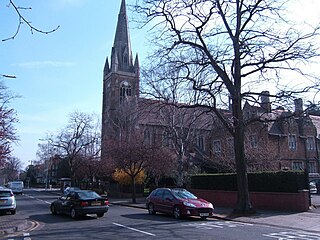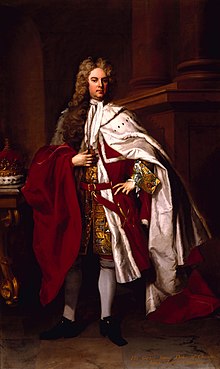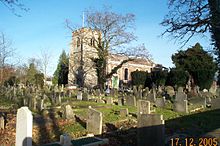William James Mathias CBE was a Welsh composer noted for choral works.

Canons Park is a public park and the name of its surrounding residential area, in the Edgware district of the London Borough of Harrow, north west London. Canons Park was a country estate which partially survives today as a public park. St. Lawrence's Church, the parish church of Little Stanmore, and the accompanying Chandos Mausoleum are located here.

Saul is a dramatic oratorio in three acts written by George Frideric Handel with a libretto by Charles Jennens. Taken from the First Book of Samuel, the story of Saul focuses on the first king of Israel's relationship with his eventual successor, David—one which turns from admiration to envy and hatred, ultimately leading to the downfall of the eponymous monarch. The work, which Handel composed in 1738, includes the famous "Dead March", a funeral anthem for Saul and his son Jonathan, and some of the composer's most dramatic choral pieces. Saul was first performed at the King's Theatre in London on 16 January 1739. The work was a success at its London premiere and was revived by Handel in subsequent seasons. Notable modern-day performances of Saul include that at Glyndebourne in 2015.

The Funeral Anthem for Queen Caroline, HWV 264, is an anthem by George Frideric Handel. It was composed and first performed for the funeral of Caroline of Ansbach at Westminster Abbey on 17 December 1737. Handel slightly re-worked the anthem and used it for the opening section of his oratorio Israel in Egypt in 1739. The theme of the first chorus was taken by Mozart as the theme for the Requiem aeternam movement of his Requiem Mass. The anthem is approximately forty minutes in length.

Rejoice in the Lamb is a cantata for four soloists, SATB choir and organ composed by Benjamin Britten in 1943 and uses text from the poem Jubilate Agno by Christopher Smart (1722–1771). The poem, written while Smart was in an asylum, depicts idiosyncratic praise and worship of God by different things including animals, letters of the alphabet and musical instruments. Britten was introduced to the poem by W. H. Auden whilst visiting the United States, selecting 48 lines of the poem to set to music with the assistance of Edward Sackville-West. The cantata was commissioned by the Reverend Walter Hussey for the celebration of the 50th anniversary of the consecration of St Matthew's Church, Northampton. Critics praised the work for its uniqueness and creative handling of the text. Rejoice in the Lamb has been arranged for chorus, solos and orchestral accompaniment, and for SSAA choir and organ.

Bradley Ellingboe is an American composer, conductor, and bass-baritone singer.
A coronation anthem is a piece of choral music written to accompany the coronation of a monarch.

Joshua is an oratorio by George Frideric Handel. It was composed in a month, from 19 July 1747 to 19 August 1747, six months before the beginning of the oratorio season. Joshua is Handel's fourth oratorio based on a libretto by Thomas Morell. The oratorio premiered on 9 March 1748 at the Covent Garden Theatre, London. Joshua is based on the Biblical story of Joshua as the leader of the ancient Israelites. The story follows the Israelites from their passage over the Jordan River into Caanan and through the Battle of Jericho. The work also includes a love story elaborated from a few hints in the Biblical narrative between Caleb's daughter Achsah and Othniel, a young soldier.

An Occasional Oratorio is an oratorio by George Frideric Handel, based upon a libretto by Newburgh Hamilton after the poetry of John Milton and Edmund Spenser. The work was written in the midst of the Jacobite rising of 1745–1746, the attempt to overthrow Handel's patrons the Hanoverian monarchy under George II and replace them with a Stuart restoration under Charles Edward Stuart, "Bonnie Prince Charlie". The Occasional Oratorio is unique among Handel's works which he labelled "oratorio" in that it does not tell a story or contain elements of a drama, but was intended as a defiant and patriotic rallying piece.

The Brockes Passion, or Der für die Sünde der Welt gemarterte und sterbende Jesus, is a German oratorio, libretto by Barthold Heinrich Brockes, first published in 1712 and seeing 30 or so more editions over the following 15 years.

The Te Deum for the Victory at the Battle of Dettingen in D major, HWV 283, is the fifth and last setting by George Frideric Handel of the 4th-century Ambrosian hymn, Te Deum, or We Praise Thee, O God. He wrote it in 1743, only a month after the battle itself, during which Britain and its allies Hannover and Austria soundly routed the French.
As pants the hart is an anthem composed by George Frideric Handel for the Chapel Royal of Queen Anne and subsequently revised. There are five versions of the work, the first being completed in 1713, and the final in 1738. HWV 251a was the first anthem Handel composed for the Chapel Royal.

George Frideric Handel was the house composer at Cannons from August 1717 until February 1719. The Chandos Anthems and other important works by Handel were conceived, written or first performed at Cannons.
Bernard Clements Barrell was an English musician, music educator and composer.

Utrecht Te Deum and Jubilate is the common name for a sacred choral composition in two parts, written by George Frideric Handel to celebrate the Treaty of Utrecht, which established the Peace of Utrecht in 1713, ending the War of the Spanish Succession. He composed a Te Deum, HWV 278, and a Jubilate Deo, HWV 279. The combination of the two texts in English follows earlier models. The official premiere of the work was on 13 July 1713 in a service in St Paul's Cathedral in London.

Messiah, the English-language oratorio composed by George Frideric Handel in 1741, is structured in three parts. This listing covers Part II in a table and comments on individual movements, reflecting the relation of the musical setting to the text. Part I begins with the prophecy of the Messiah and his birth, shows the annunciation to the shepherds and reflects the Messiah's deeds on earth. Part II covers the Passion in nine movements including the oratorio's longest movement, an air for alto He was despised, then mentions death, resurrection, ascension, and reflects the spreading of the Gospel and its rejection. The part is concluded by a scene called "God's Triumph" that culminates in the Hallelujah chorus. Part III of the oratorio concentrates on Paul's teaching of the resurrection of the dead and Christ's glorification in heaven.

Sing Unto God, is an anthem composed by George Frideric Handel. It was performed for the royal wedding on 27 April 1736 at the Chapel Royal in St James's Palace, London with Francesca Cuzzoni-Sandoni, Carlo Broschi "Farinelli", and Francesco Bernardi "Senesino". The text was adapted from verses of Psalms 68, 106 and 128.

St. Lawrence, Whitchurch, is a Church of England parish church in Little Stanmore in the London Borough of Harrow, England. The building is Grade I listed. It retains a stone tower dating from ca. 1360, but the main body of the building was constructed in the 18th century in Baroque style.

Chandos Anthems, HWV 246–256, is the common name of a set of anthems written by George Frideric Handel. These sacred choral compositions number eleven; a twelfth of disputed authorship is not considered here. The texts are psalms and combined psalm verses in English. Handel wrote the anthems as composer in residence at Cannons, the court of James Brydges, who became the First Duke of Chandos in 1719. His chapel was not yet finished, and services were therefore held at St Lawrence in Whitchurch. The scoring is intimate, in keeping with the possibilities there. Some of the anthems rely on earlier works, and some were later revised for other purposes.

Benjamin Britten's Jubilate Deo is a sacred choral setting of Psalm 100 in English, written in 1961 for St George's Chapel, Windsor Castle, "at the request of H.R.H. The Duke of Edinburgh". Britten scored the joyful music in C major for four-part choir and organ. A late companion piece to his 1934 Te Deum in C, it is also known as his Jubilate in C. It has been performed and recorded often, including on Prince Philip's 80th and 90th birthdays, and for his funeral service on 17 April 2021.













